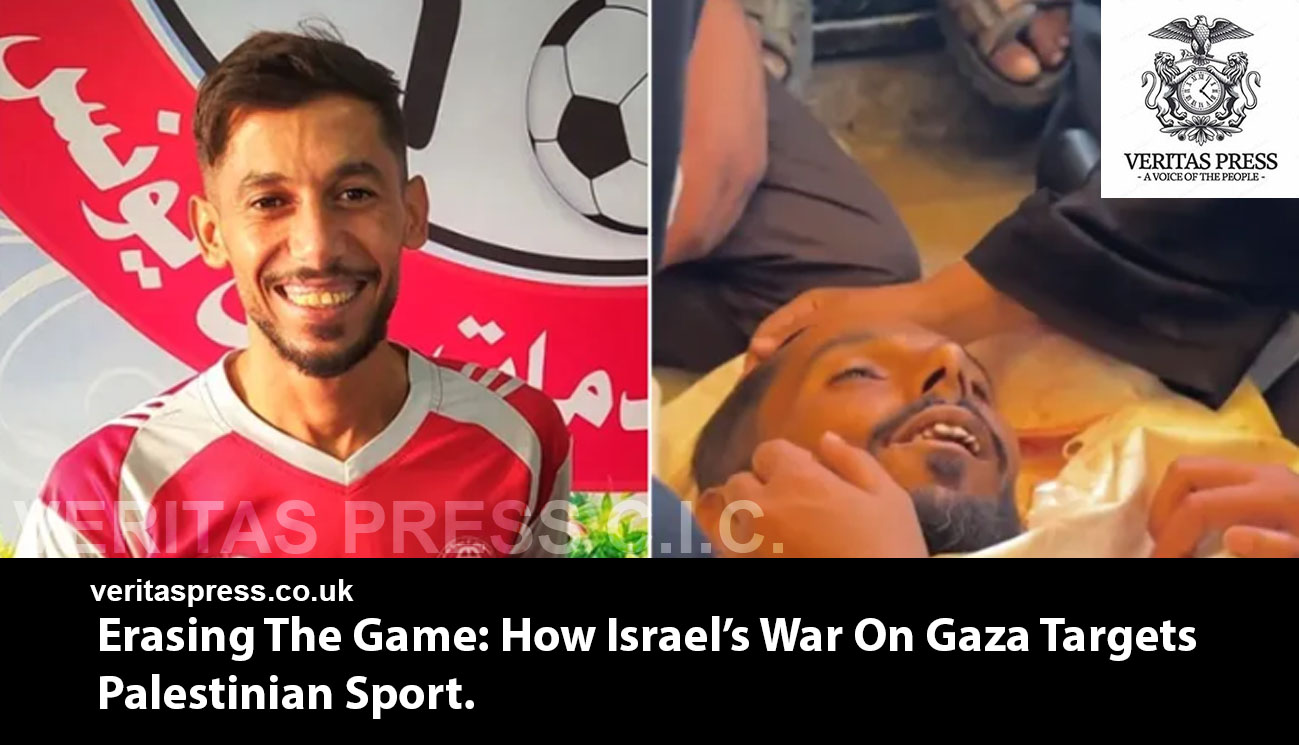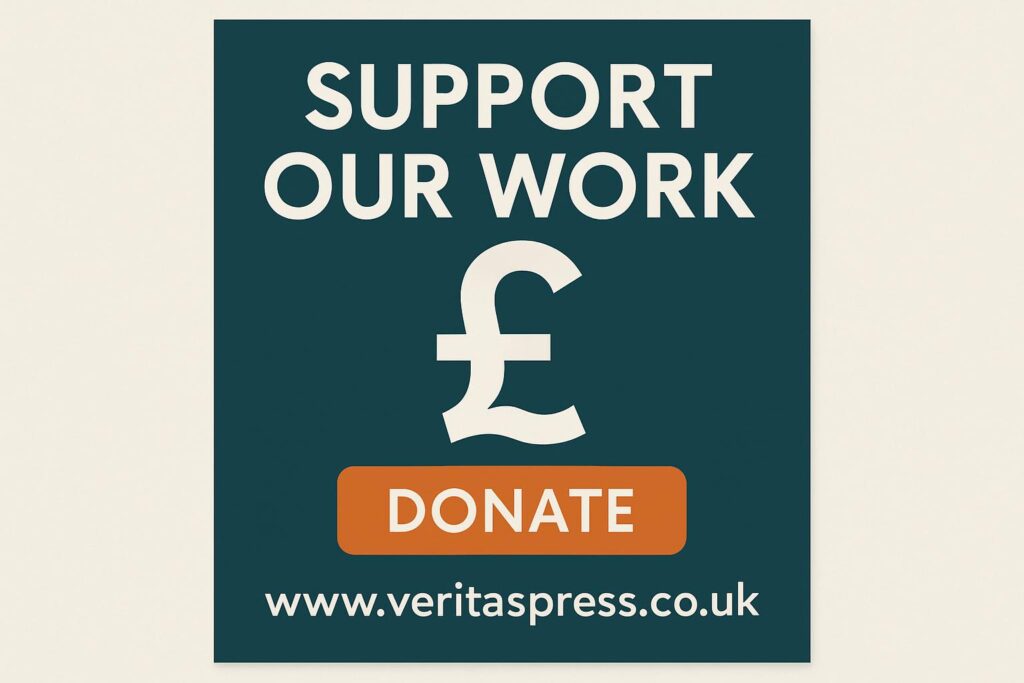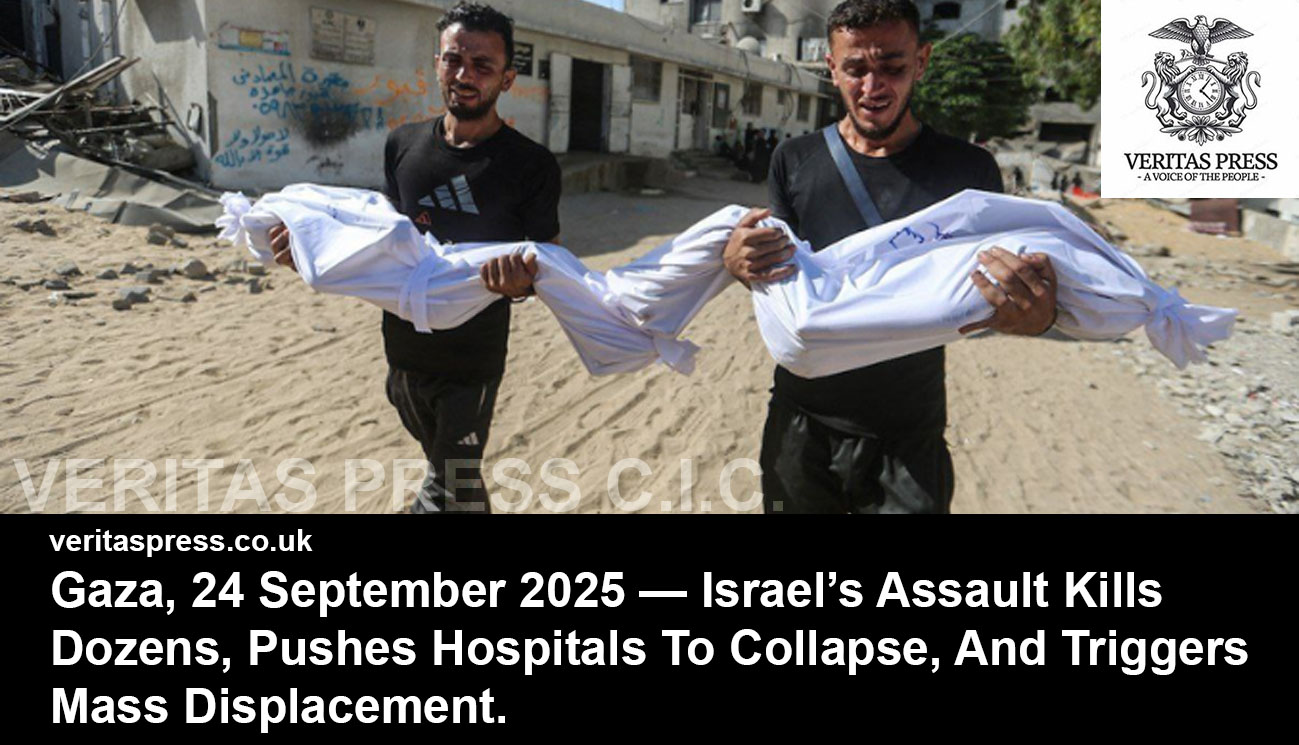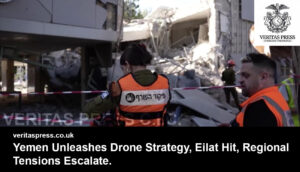Press Release: Veritas Press C.I.C.
Author: Kamran Faqir
Article Date Published: 25 Sept 2025 at 16:48 GMT
Category: Middle East | Palestine-Gaza | Palestinian Sport
Source(s): Veritas Press C.I.C. | Multi News Agencies
On Tuesday morning in Rafah, 36-year-old Palestinian footballer Mohammad al-Satri joined hundreds of displaced Palestinians waiting in Al-Shakoush, waiting for a sack of flour that could mean the difference between hunger and survival. Once celebrated on Gaza’s pitches as the “promotion talisman” for carrying underdog clubs into glory, al-Satri now stood in line not for medals or trophies but for bread, his presence a stark metaphor for the annihilation of Palestinian sport, culture, and life itself under Israel’s war.
Eyewitnesses say Israeli forces opened fire on the crowd. Al-Satri was struck in the chest and died within minutes.
“People came only for food. Suddenly, bullets were everywhere,” said Mahmoud, a fellow displaced resident who survived the shooting. “We carried Mohammad to the ambulance, but he was already gone.”
His killing is not just another statistic in Gaza’s death toll. It is emblematic of the systematic destruction of Palestinian sport and culture, the killing of its athletes, the bombing of its stadiums, and the silencing of a community where football was once both passion and resistance.
The Journeyman Striker:
Born in Rafah’s Saudi neighbourhood, al-Satri’s career mirrored the resilience of Gaza itself.
- Early years: He began with Qadisiyah Rafah Club, guiding them to a historic promotion to the Premier League in 2016–17.
- Shabab Rafah & Services Club: Loan spells at Khadamat Rafah brought trophies, including the Super Cup win against Shabab Khan Yunis.
- Al-Tuffah & Ahli Gaza: Known for lifting struggling clubs into higher divisions, he helped Al-Tuffah and later Ahli Gaza achieve promotions in 2019–20.
- The “traveller of Gaza football”: He cycled through at least eight clubs, from Al-Sadaqa to Khadamat al-Maghazi, earning a reputation as the man who delivered promotions wherever he went.
“Mohammad was like oxygen for our team,” remembered coach Nabil Harb of Khadamat al-Nuseirat. “He told the younger players: We play because they want us silent. Every goal proves we’re still alive.”
A Mounting Toll On Athletes:
Al-Satri’s death is part of a grim roll call. Since October 2023, Israel’s bombardment of Gaza has killed at least 774 athletes and scouts, according to the Palestine Football Association (PFA). Among them are:
- 355 footballers, ranging from Premier League players to youth talent.
- 277 sports federation members and coaches.
- 142 Palestinian Scouts, who often doubled as community organisers.
- 119 missing athletes, likely buried under rubble or unaccounted for.
Among the dead are some of Gaza’s biggest footballing names:
- Suleiman al-Obeid (“the Palestinian Pelé”) — killed in an airstrike while waiting for food in southern Gaza.
- Mohammed Abu Zaid (captain of Khadamat al-Nuseirat) — killed in January 2025.
- Goalkeeper Mohammed al-Ghaffari — killed in November 2024.
- Playmaker Tariq al-Hour — killed in October 2023.
“This is not a coincidence,” argued PFA President Jibril Rajoub. “Israel is exterminating Palestinian sport just as it exterminates our people.”
Stadiums In Ruins:
Gaza’s stadiums, once the pride of its communities, now stand as rubble.
- Al-Yarmouk Stadium in Gaza City, once the beating heart of Palestinian football, has been reduced to a cratered ruin.
- Rafah Municipal Stadium, where al-Satri once played, is now unrecognisable after repeated shelling.
- Community clubhouses — vital meeting points for scouts and youth teams-have been bombed, looted, or turned into shelters for the displaced.
According to Euro-Med Human Rights Monitor, 288 sports facilities have been destroyed since October 2023. “The destruction of sports infrastructure is cultural erasure,” the group wrote in a recent statement. “It eliminates not only recreation but the social glue that binds Palestinian youth.”
The Breadline Massacres:
Al-Satri died waiting for food, part of a devastating pattern.
The UN Office for the Coordination of Humanitarian Affairs (OCHA) reports that over 2,500 Palestinians have been killed while queuing for aid since May 27, 2025. Most were shot or bombed while waiting for flour, water, or canned goods.
Doctors in Rafah describe hospitals overwhelmed by injuries from aid line attacks. “The majority are women, children, or elderly men,” said Dr. Lina Awad at Abu Youssef al-Najjar Hospital. “They come with gunshot wounds to the chest and head. These are not stray bullets. These are deliberate shots.”
Amnesty International concurs, documenting a “pattern of deliberate and systematic attacks on civilians at aid distribution points.”
International Hypocrisy In Sport:
When Russia invaded Ukraine in 2022, FIFA and UEFA immediately suspended Russian clubs and national teams. During apartheid, South Africa was excluded from the Olympics and expelled from FIFA for nearly three decades.
Yet Israel, accused by the International Court of Justice of committing genocide, continues to participate in global tournaments.
“Why do Ukrainian footballers deserve solidarity but Palestinians do not?” asked rights lawyer Raji Sourani. “FIFA’s silence is complicity.”
Even within Europe, cracks are forming: some national federations have quietly indicated reluctance to face Israel in qualifiers, while fan groups across Spain, Ireland, and the UK have staged protests outside UEFA headquarters.
Cultural Genocide By Design:
Analysts argue that the destruction of sport is part of Israel’s broader strategy of erasing Palestinian cultural life.
“By killing athletes and bombing stadiums, Israel strikes at symbols of continuity and hope,” said Dr. Hanan Ashrawi, former PLO Executive Committee member. “This is cultural genocide. Sport is not spared because it inspires resilience.”
Human Rights Watch’s Omar Shakir adds: “The consistent targeting of aid queues and cultural sites points to intent. This is policy, not collateral damage.”
Profiles In Loss: The Athletes Gaza Buried.
Suleiman al-Obeid (“Palestinian Pelé”)
Once Gaza’s most beloved player, al-Obeid captained the national team and inspired generations. His death in an airstrike was mourned like the loss of a cultural giant.
Mohammed Abu Zaid
Captain of Khadamat al-Nuseirat, Abu Zaid, was killed alongside his family. Teammates say he was “the soul of the club.”
Young Scouts
Among the 142 Scouts killed are boys as young as 12. Many were community leaders in training, future coaches, referees, and teachers.
Evidence And Accountability.
The killings of al-Satri and other athletes fall under the scrutiny of the International Criminal Court, which has issued arrest warrants for Benjamin Netanyahu and senior officials.
For investigators, the forensic pattern is clear:
- Aid line shootings are repeated and documented.
- Sports facilities are consistently destroyed.
- Athletes are killed in disproportionate numbers.
Legal scholars argue these are not incidental but part of a genocidal policy targeting both life and culture.
Conclusion: Playing While Gaza Burns.
In Gaza’s refugee camps, children once shouted al-Satri’s name after scoring goals. Today, they queue for bread under the threat of sniper fire.
The world of sport now faces its reckoning. If FIFA and UEFA once acted against Russia and apartheid South Africa, why do they look away when Gaza’s athletes are buried?
“Every silence is complicity,” Rajoub warned. “If FIFA will not defend sport itself, who will?”
For now, global football plays on, while in Gaza, the fields lie empty, the stadiums are rubble, and the stars of Palestinian sport are lowered into graves.
Advertisements
Tags:






























Leave a Reply